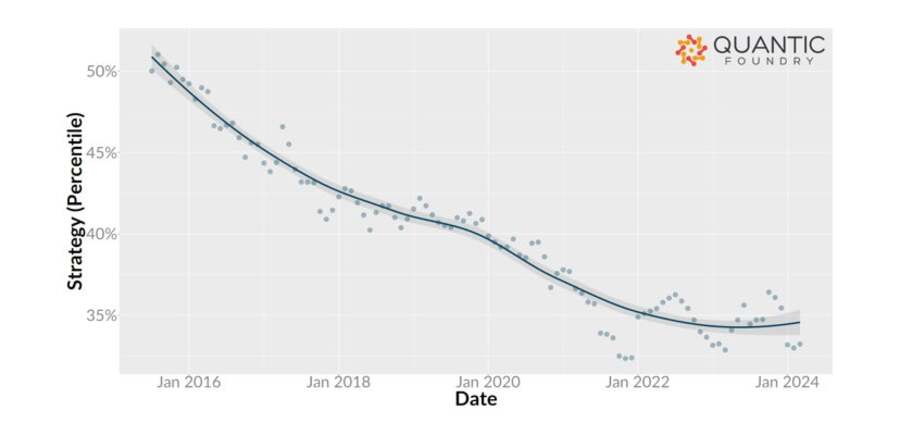
According to a horrifying new report, deep strategy games like those in the Civilization or XCOM franchises are becoming increasingly unappealing to modern gaming audiences. A study from Quantic Foundry collected data using the researcher's gamer motivation profile (GMP) tool over the last nine years and found that, overwhelmingly, players have dramatically changed their tune on strategy games. One possible explanation is that we no longer have the attention spans required to appreciate this once-great genre properly.
A player's GMP is determined by tracking how different aspects of gaming appeal to them across various categories, such as Destruction, Competition, Excitement, Community, Strategy, Challenge, Power, Completion, Fantasy, Discovery, Story, and Design. Since the study began in 2015, scores in each category have remained relatively consistent, with the sole exception being Strategy, which has catastrophically plummeted.
Quantic Foundry found that: "Strategy was the clear exception; it had substantially declined over the past nine years, and the magnitude of this change was more than twice the size of the next largest change." Because there is no justice in this universe, the study also found that "67% of gamers today care less about strategic thinking and planning when playing games than the average gamer back in June 2015".

The Strategy category, in the context of Quantic Foundry's study, is described like this: "Gamers who score high on this component enjoy games that require careful decision-making and planning. They like to think through their options and likely outcomes. These may be decisions related to balancing resources and competing goals, managing foreign diplomacy, or finding optimal long-term strategies. They tend to enjoy both the tactical combat in games like XCOM or Fire Emblem and seeing their carefully devised plans come to fruition in games like Civilization, Cities: Skylines, or Europa Universalis."
Quantic Foundry could not find a concrete reason for the trend, even across separators such as men and women or by geographic location (with the notable exception of China, where gamers "have a very different gaming motivation profile"). Potential factors that were pointed to include the increased dominance of social media apps and platforms like YouTube, where shorter clips with quicker cuts are more likely to generate more clicks. Even more bleakly, the researcher suggests:
"Another potential hypothesis is that social media's increasing negativity, polarization, intrusiveness, and emotional manipulation has created a persistent cognitive overload on our finite cognitive resources. Put simply, we may be too worn out by social media to think deeply about things. It's clear that gamers have become less interested in strategic thinking over the past nine years... that gamers are now more easily cognitively overloaded when they play games and are more likely to avoid strategic complexity."